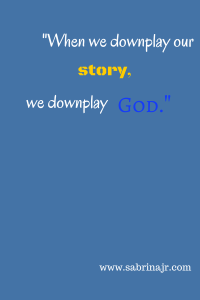Jesus said, “You’re asking the wrong question. You’re looking for someone to blame. There is no such cause-effect here. Look instead for what God can do. (John 9:3, The Message)
Story telling is an art. The ones we love to hear are dramatic and descriptive. We’re transported right into the scene alongside the narrator. Novels are critiqued for their storylines, their plots. When the story is right, then someone is willing to invest in moving the story from page to screen. No producer spends a ton of money with the intention of producing a snore-fest. Stories are great.
Until they’re ours.
When it comes to our story, many times we prefer to stay close-lipped. There’s risk of boring someone or being misunderstood. Let’s not talk about the all-too-familiar rejection. Then there’s the falsehood we tell ourselves: that our story doesn’t matter or doesn’t count. That there are others with the same story who can retell it much better than you can anyways. So, we’ll leave the spotlight for them. Except we’re practically bursting at the seams wanting to reveal our innermost selves as we hold back our tongues.
What happens to us is part of a bigger picture. When we share our stories, we are showcasing what God has done, can do and will continue to do for us. There is freedom in sharing our story. Freedom for the teller and freedom for the receiver. Someone needs your personal testimonial, even if you never know who. They want to know and understand how someone similar to them found the strength to conquer this obstacle. They want to know that they are not alone.
As the teller, you provide an authenticity to the story that is unmatched. Your ethnicity, marital status, parental status, spirituality, insight, ideas may all be similar in some way to another. But they are never identical because there is only one you.
There is freedom in sharing your story. Freedom for others to experience God and His almighty glory for themselves.
The same way that you have.

